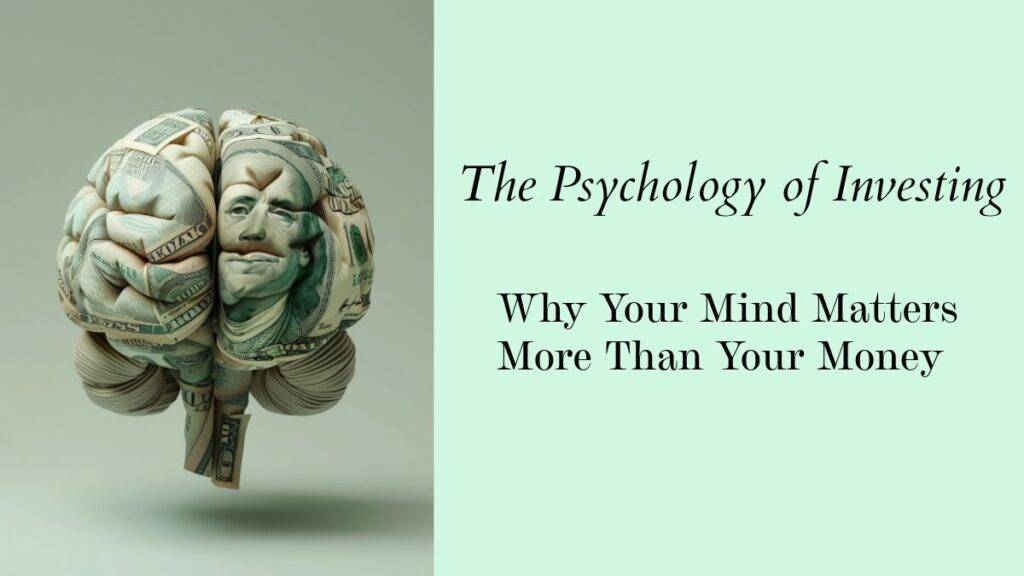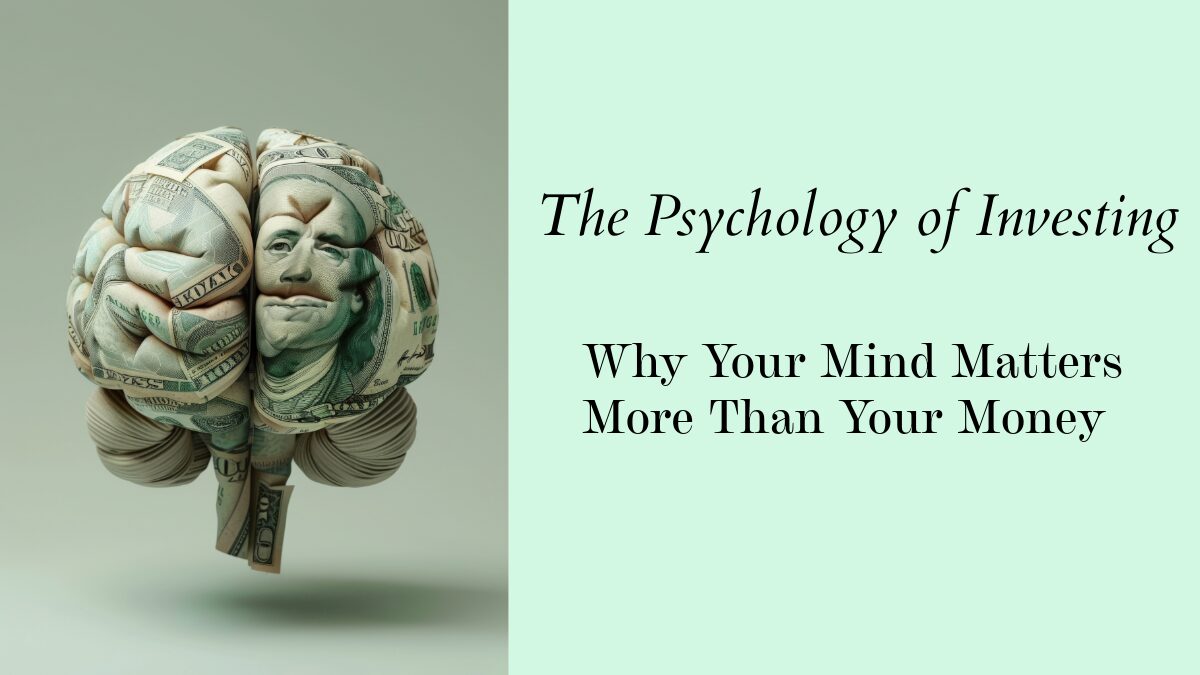The biggest obstacle between most investors and financial success isn’t market volatility, economic cycles, or even poor stock selection—it’s the gray matter between their ears. After years of studying market behavior and investor psychology, this truth has become increasingly clear: successful investing depends far more on emotional discipline than on technical expertise.
The Mental Game of Money
Think of investing as a game where the rules are simple, but playing is hard. The basic principles can be learned in an afternoon, but mastery requires years of disciplined practice and, more importantly, control over one’s emotions. The market is an unforgiving teacher that presents the test before the lesson, and the tuition for these lessons can be extraordinarily expensive.
Most investors enter this game believing they’re playing against the market. This is their first and most costly misconception. In reality, they’re playing against themselves—against their own biases, emotions, and psychological tendencies that work against long-term success.
Consider this striking disparity: over the past thirty years, the S&P 500 has returned roughly 10% annually. Yet studies consistently show that the average investor has captured less than half of that return (DALBAR, 2023). This gap isn’t primarily due to poor investment choices—it’s due to poor investment behavior. We are, as it turns out, remarkably skilled at being our own worst enemies in the financial markets.
The Emotional Rollercoaster
Markets move in cycles, but human nature remains constant. This pattern plays out with the reliability of a Greek tragedy, and understanding it is crucial for any investor hoping to maintain emotional equilibrium:
The cycle begins with skepticism after a market bottom. As prices start to rise, skepticism gives way to cautious optimism. This optimism gradually breeds confidence as gains accumulate. Confidence, fueled by apparent success, transforms into euphoria. And euphoria, inevitably, leads to despair when the cycle turns.
At market peaks, you’ll hear phrases like “this time it’s different” and “we’ve entered a new paradigm.” At market bottoms, the rhetoric shifts to “stocks are dead” and “the market will never recover.” Both statements are usually wrong, and acting on either can be devastatingly expensive.
The most successful investors understand something that others miss: the best investment opportunities typically arise precisely when others are convinced they don’t exist. This contrarian mindset—the ability to lean against the prevailing winds of market sentiment—is what separates exceptional investors from the crowd.
The Seven Deadly Sins of Investing
Like ancient morality tales, the paths to investment destruction are well-worn and predictable. Understanding these psychological pitfalls is the first step toward avoiding them:
1. Pride (Overconfidence)
The belief that you can consistently outsmart the collective wisdom of millions of market participants. This manifests in attempting to time markets, picking “hot” stocks, or believing you have unique insights that others have somehow missed. The market has a way of humbling even its most experienced participants.
2. Greed (Performance Chasing)
The tendency to abandon sound strategy to chase whatever’s currently performing well. This often means buying high and selling low—the exact opposite of successful investing. By the time an investment becomes dinner party conversation, the opportunity has usually passed.
3. Sloth (Mental Laziness)
The failure to maintain investment discipline or conduct proper due diligence. Good investing should be boring. If you’re being entertained by your investment activity, you’re probably doing something wrong. The work of successful investing happens in quiet moments of research and reflection, not in the excitement of trading.
4. Wrath (Emotional Trading)
Making investment decisions based on anger, frustration, or the need to “get even” with the market. The market is entirely indifferent to your emotions and your need for validation. Trading with anger only compounds mistakes.
5. Envy (FOMO)
The destructive habit of comparing your returns to others or trying to replicate their success. Every investor’s circumstances, goals, and risk tolerance are unique. The only benchmark that truly matters is whether you’re meeting your own financial objectives.
6. Gluttony (Over-trading)
The misconception that more activity leads to better results. In reality, excessive trading usually only enriches brokers while diminishing your returns through transaction costs and poorly timed moves. Patience and restraint are virtues in investing.
7. Fear (Panic Selling)
Perhaps the most costly sin—succumbing to market anxiety and selling at the worst possible time. More wealth has been lost preparing for corrections, or reacting to them, than in the corrections themselves.
The Antidote
Success in investing requires developing what I call “emotional immunity”—the ability to resist the contagious nature of market sentiment. This immunity isn’t natural; it must be consciously developed through understanding and practice.
Embrace Uncertainty
The future is inherently uncertain. Instead of trying to predict it with precision, prepare for multiple possibilities. Build a portfolio that can withstand various scenarios rather than betting everything on a single outcome. The best investors aren’t prophets; they’re pragmatic realists who understand the limits of their knowledge and plan accordingly.
Embracing uncertainty means:
- Maintaining appropriate diversification
- Avoiding concentrated bets on specific outcomes
- Understanding that being approximately right is better than being precisely wrong
- Keeping some powder dry for unexpected opportunities
Focus on Process, Not Outcomes
In investing, good decisions can lead to bad outcomes, and poor decisions can occasionally produce good results. This randomness in short-term results makes it crucial to focus on the quality of your decision-making process rather than any single outcome.
A robust investment process includes:
- Clear criteria for investment decisions
- Regular portfolio review and rebalancing
- Systematic risk management
- Continuous learning and adaptation
Develop a Contrarian Mindset
The ability to think independently of the crowd is invaluable in investing. This doesn’t mean automatically doing the opposite of whatever is popular but rather developing the capacity to analyze situations objectively, regardless of prevailing sentiment.
True contrarian thinking involves:
- Questioning common assumptions
- Looking for evidence that contradicts your beliefs
- Being comfortable with unpopular positions
- Understanding that discomfort often signals opportunity
Create Systems to Guard Against Yourself
Your future self under stress will make worse decisions than your current calm self. Creating systematic approaches to investing helps protect you from your own worst tendencies:
Essential systems include:
- A written investment policy statement
- Automated regular investments
- Predetermined rebalancing schedules
- Clear buy and sell criteria
- An investment journal documenting decisions and rationale
The Path Forward
Years of studying market behavior and investor psychology have crystallized several fundamental principles that I’ve found invaluable. These aren’t complicated strategies or market timing techniques – they’re simple, timeless wisdoms that form the foundation of intelligent investing.
Simplicity Wins
The investing world is rife with complexity. Complex investment strategies, elaborate trading systems, and overly sophisticated analysis often do more harm than good. The more moving parts an approach has, the more potential failure points it contains.
In contrast, simple, robust frameworks tend to outperform elaborate ones over the long run. When it comes to investing, focus on mastering the fundamentals rather than getting drawn into the latest fads and gimmicks. Stick to the basic principles that have stood the test of time.
Time Is Your Friend
One of the most powerful yet underappreciated advantages in investing is the power of time. The longer your investment horizon, the more the odds tilt in your favor. Market volatility has a way of smoothing out over longer periods, and the magic of compounding returns becomes increasingly pronounced given sufficient time.
Too many investors get caught up in the day-to-day noise and short-term fluctuations, losing sight of the big picture. When building wealth, think in decades, not quarters or years.
Know Your Limits
The most dangerous investing mistakes often come from overestimating one’s knowledge or capabilities. Overconfidence and the illusion of control can lead investors to take outsized risks or make decisions outside their areas of competence.
Maintaining intellectual humility – honestly acknowledging the limits of your understanding – is paramount. It’s far better to recognize your blind spots than to learn about them through painful (and costly) experiences.
Think Like an Owner
One of the most potent mental shifts an investor can make is to stop viewing stocks as abstract trading vehicles and start thinking of them as partial ownership stakes in real underlying businesses.
This ownership mentality naturally leads to better long-term decision-making. Rather than getting caught up in short-term price movements, you begin to focus on the intrinsic value being created by the companies you’ve invested in. This shift in perspective is transformative.
Stay Rational
Investing is a game of temperament, not just intellect. When market emotions run high – whether it’s euphoria or despair – opportunities often present themselves for the clear-thinking investor.
While the crowd is gripped by fear or blinded by greed, the investor who can maintain rationality and objectivity is often best positioned to capitalize. Cultivating the ability to step back, analyze situations logically, and make decisions based on reason rather than sentiment is an invaluable skill.
The Paradox of Successful Investing
Here’s the great paradox of investing: it is intellectually simple but emotionally challenging. The principles are straightforward, but following them requires uncommon strength of character. This is why successful investing is more about temperament than intelligence.
The good news is that these mental skills can be developed. Each market cycle presents new opportunities to practice emotional discipline. Each crisis offers a chance to refine your psychological fortitude. Each mistake, adequately analyzed, contains lessons that make you a better investor.
Keep in mind that the biggest returns come not from picking the right stocks but from being the right kind of investor—one who can maintain composure while others lose theirs, who can think independently while others follow the herd, and who understands that the most significant risk isn’t missing out on gains, but failing to stick to their strategy.
In the end, mastering the psychology of investing isn’t just about making money. It’s about developing mental qualities that serve you well in all aspects of life: patience, discipline, emotional stability, and clear thinking under pressure. These are skills worth cultivating, regardless of what the market does next.
Investment success, ultimately, is less about what the market does and more about how you respond to it. Master your psychology, and you’ve mastered the hardest part of investing.
Reference
DALBAR, Inc. (2023). 2023 DALBAR Quantitative Analysis of Investor Behavior. https://www.dalbar.com/catalog/product/168
Disclaimer: This article reflects the author’s opinion and is not financial advice. The author is not a licensed financial advisor. Content is for informational purposes only. Consult a qualified financial professional before making investment decisions.


